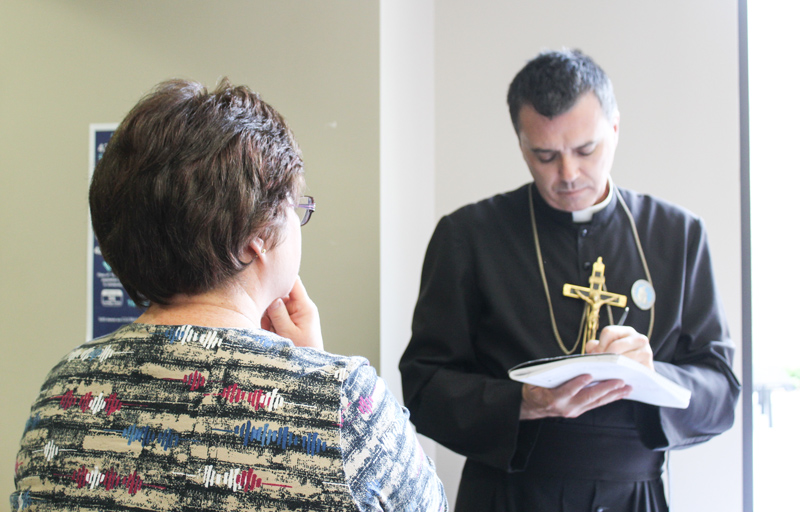
GREENVILLE—Devotion to the Blessed Mother and the Holy Eucharist led hundreds of people to spend a week¬end of prayer, worship and reflection together in the Upstate.
The third Marian Eucharistic Conference held at St. Joseph’s Catholic School drew about 400 people from the Carolinas and as far away as Vermont, according to organizer Heesun Devlin.
Speakers at the conference focused on a wide variety of spiritual topics and gave participants new perspectives on how to live as Christians and incorporate Gospel values into their days.
Father of Mercy Wade Menezes offered two sessions on the daily duties of Christians and forming a life of generosity. He said people can gain an unselfish perspective by following five basic suggestions: be faithful to your daily duty; practice the sacraments; understand the reality of vice and virtue; exude a trinitarian spirituality centered around God’s presence as Father, Son and Holy Spirit; and focus more on other people than personal desires.
Father Menezes said it is necessary to combine living with genuine holiness and being generous. Being holy, he said, is “not a pose,” meaning truly holy people don’t have to spend all day in prayer separated from the world.

“God gives you your own personality to live in the world, a personality that should be geared toward living a life of virtue and not vice,” he said. “We need to have good self-knowledge and balance our lives among prayer, work and recreation.”
He urges people to avoid anger and rage, especially in speech and thought, and to focus on speaking only words that reflect charity, humility and courtesy.
“Sometimes a noble silence is the best thing,” he said. “Thinking humble thoughts often leads to true peace, and a moment of simply saying ‘thank you’ to someone shows you are thinking of their benefit and not yours.”
Father Joseph Mary Wolfe of the Franciscan Missionaries of the Eternal Word offered a moving perspective on “The Meaning of Suffering.”
“We have to look at everything from an eternal perspective,” he said. “The sufferings of today have relevance in eternity.”
 Sometimes people bring on their own troubles, a phenomenon he calls “illegitimate suffering.” These are things like grudges, resentments, petty arguments and slights that we refuse to release, allowing them to damage our lives and hinder our relationship with God.
Sometimes people bring on their own troubles, a phenomenon he calls “illegitimate suffering.” These are things like grudges, resentments, petty arguments and slights that we refuse to release, allowing them to damage our lives and hinder our relationship with God.
“We have to put our past in the ocean of God’s mercy, because the past is gone,” Father Wolfe said. “That includes your own guilt. We need to look at the bigger picture and count today’s blessings. You can either join the chorus of thanksgiving or the chorus of grumbling.”
He said illegitimate suffering also includes looking down on the grace of serving others, treating those moments of service as nuisances instead of a chance to show God’s love to another person.
He also described “beautiful suffering,” which spans a wide spectrum from the love people show each other to the suffering that comes with illness, or with helping another get through an illness.
“It is said that when we begin to love, we begin to suffer, because we want the best for someone’s welfare,” he said. “When you suffer with someone, including at the time of death, there are great graces that come. Often at the end of life, there is a beautiful flowering of forgiveness and getting back to the essentials of life. We can see what really matters.”
Tim Staples, an author and well-known apologist, talked about his spiritual journey from being an evangelical Protestant to becoming Catholic. He discussed the importance of Mary in Christianity and said her role is often misunderstood by non-Catholics.
“Mary is central to all the teachings of the Church,” Staples said “We see in her who we are as Christians. In the end, you can’t separate Mary from Jesus. In her, we see all the promises of God fulfilled. She is our hope.”
Father Frank Pavone, national director of Priests for Life, spoke about basic things people in the pews can do to eradicate abortion, and discussed how Pope Francis’ spiritual approach speaks to the pro-life cause.
“By looking at his behavior, you see that Pope Francis has a desire to bring Christ to the ones who are the most hurt, wounded and oppressed, the most vulnerable,” Father Pavone said. “He seeks out the most defenseless.”
Father Pavone said Pope Francis’ call for greater care for Earth and the environment includes a concern for the unborn.
“He stresses the fact that everything is inter-related,” he said. “If you have a heart of mercy you must want to help the helpless wherever they are, including the unborn child.”

